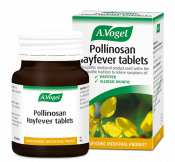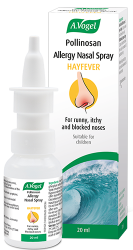What foods help to relieve allergies?
Allergic rhinitis occurs when the immune system over-reacts to allergens like dust mites, mould and pollen. In someone with this condition, the body sees these things as dangerous and so, instead of just letting them pass by as would usually be the case, it tries to fight them.
There are a number of treatments and remedies available for allergic rhinitis sufferers, but diet offers up another means of managing the condition. There are, for example, a number of foods that can help to relieve allergy symptoms including:
- Chilli peppers
- Garlic
- Pineapple
- Salmon
- Oranges
- Herbal tea
- Yoghurt.
Now I'll take a closer look at why these things are helpful, plus I have a few recipes up my sleeve to help you add more of these foods and drinks to your diet!
1. Chilli peppers
The mucous membranes that line the nose produce mucus to trap foreign particles like dirt and germs. During a reaction, though, these mucous membranes can get irritated and inflamed by allergens, thus leading to an increase in the production of mucus.
This excess mucus may settle in the sinuses, causing ear infections and congestion. In addition, as large amounts of histamine are produced by the immune system in response to allergens, the nasal passages may swell, making it harder to breathe.
So, congestion can be a big problem for people with allergic rhinitis but, fortunately, spice can help.
Ever been a little generous with the chilli powder in your homemade curry and felt your nose begin to run? Well, this effect is caused by capsaicin, a compound found inside chilli peppers. This compound can be helpful when we are feeling congested as it breaks down mucus, causing it to flow. So, it turns out you can have a tasty meal and help your allergy symptoms at the same time – just remember to keep your tissues handy!
Our website offers a host of spicy recipes to choose from but I particularly like the spicy butternut squash soup. With this recipe you can add as many chillies as you like to really increase the intensity of the heat. Plus, it's super tasty, healthy and is packed full of nutrients and vitamins too!

2. Garlic
Garlic may be of benefit to allergic rhinitis sufferers because it contains quercetin.
Quercetin is a type of polyphenol (a chemical compound) that can help control the levels of histamine being produced by the body. Also, as it is able to keep histamine levels steady, quercetin has an anti-inflammatory effect, meaning it may keep allergy symptoms such as itchy skin and congestion in check.
If you're not a fan of garlic then the good news is there are a host of other foods that contain quercetin, including:
- Onions
- Peppers
- Broccoli
- Apples
- Berries
- Beans.
So, next time your allergy flares up, I'd recommend finding ways to include these fruits and vegetables in your diet on a regular basis. Our raspberry and blueberry smoothie is an excellent place to start – it is a refreshing and tasty way to get more quercetin-rich fruits!
3. Pineapple
Pineapples are the only fruit to contain bromelain, a compound that can be helpful for those with allergic rhinitis. Some studies have suggested that bromelain reduces swelling which could, therefore, help you deal with congestion.1 Inflammation in the nasal passages and on the skin usually develops due to excess histamine.
On top of this, bromelain could help to thin mucus which may help symptoms such as congestion and coughing.
With all this positivity surrounding pineapple, you might be thinking of including more in your diet through fruit salads and smoothies. However, don't forget you can make it into a tasty dessert too! Our pineapple ice lollies make the perfect after-dinner snack but, if you want to try something more adventurous, we also have a pineapple cheesecake. This cheesecake is refreshing and light, plus the natural ingredients mean it's completely vegan. So, why not treat yourself and help your allergic rhinitis symptoms at the same time?

4. Salmon
Oily fish like salmon is a good source of omega-3. This is has anti-inflammatory properties which means it too could help relieve symptoms of allergic rhinitis including a sore throat and swollen eyes.
Alongside salmon, other foods that are rich in omega-3 include:
- Mackerel
- Salmon
- Herring
- Anchovies
- Flaxseeds
- Chia seeds
- Tuna.
There are many easy fish recipes on our website but I particularly love our potato cakes with smoked salmon and papaya chutney. Alternatively, you could add some nuts and seeds to a salad because, as well as helping the symptoms of allergic rhinitis, this will make the dish a little more exciting than just eating lettuce! These healthy dishes should help you to add more omega-3 into your diet.
5. Oranges
Too much histamine can bring out a skin rash and inflammation but vitamin C is a natural antihistamine, meaning it could help to counteract these effects. As well as this, vitamin C supports the immune system which is important if you want to get on top of your symptoms as these develop when the immune system over-reacts to allergens.
Our bodies cannot produce or store vitamin C so it's up to you to add it to your diet. As well as oranges, some other fruit and vegetables than contain vitamin C include:
- Red and green peppers
- Strawberries
- Blackcurrants
- Broccoli
- Brussels sprouts
- Potatoes
- Kiwi
Our easy, no-bake orange oat bars make the perfect snack and will help you get that daily dose of vitamin C, as will our strawberry and pear smoothie. However, if you feel you need a little bit of help to up your vitamin C intake, you could try Nature-C.
6. Herbal tea
You'll be pleased to know that relaxing with a cup of tea could actually help your allergic rhinitis symptoms! However, before you go reaching for a cup of English breakfast, take note that any tea high in caffeine could trigger the release of histamine which is likely to make symptoms worse. Herbal teas, on the other hand, could bring some relief.
If congestion is problematic, peppermint tea can help as it thins mucus so that it flows easily from the nose. You should also find that the steam from the hot liquid has this effect as well.
Green tea is another good option as research suggests it could strengthen the immune system.2 Chamomile, on the other hand, is thought to have an anti-inflammatory affect which, as we have seen, is a good feature when it comes to battling allergic rhinitis.3
Also, we must not neglect to mention nettle tea which research shows has an anti-inflammatory effect.4 It is also a natural antihistamine and contains vitamin C meaning it's definitely worth trying next time you feel your symptoms coming on.
It seems there is plenty of choice when it comes to teas that could help your allergic rhinitis!
7. Yoghurt
Some varieties of yoghurt contain probiotics which research shows could have a positive effect on allergic rhinitis symptoms, particularly when it is pollen the individual is sensitive to.
A recent study by the University of Florida's Department of Food Science and Human Nutrition found that taking a probiotic reduced allergy symptoms and improved overall quality of life.5
So, why exactly is this the case? Well, one theory is that, over time, we have become increasingly hygiene-focused which means our bodies aren't exposed too much bacteria. This could reduce the variety of bacteria found in the gut which, in turn, overwhelms the immune system so it becomes more likely to react to harmless substances like pollen and animal dander.6
An increased reliance on processed foods may also disrupt the balance of good and bad bacteria in the gut. Again, this could have implications in terms of how effective the immune system is. Probiotics could help here by increasing the amount of good bacteria in the gut.
If you'd like some further information on this topic, have a look at our blog 'How can probiotics help the immune system?'.
Now, there is evidence to suggest that dairy, particularly milk, could make congestion worse so I'd advise opting for dairy-free yogurt if you want to test the theory that probiotics can help sufferers of allergic rhinitis. Watch out for the kinds that are high in sugar and fat – natural, plain yoghurts are best.
Having yoghurt for breakfast is a great way to include more probiotics in your diet. I'd recommend you top it with some homemade muesli for some extra antioxidants, fibre and protein too!

Other helpful foods
The foods listed above are definitely the main ones to try in an attempt to deal with allergic rhinitis. That being said, there are still a few others that could be helpful, including:
- Ginger – this has antioxidant and anti-inflammatory effects which may help combat symptoms like a sore throat, irritated eyes and blocked nose.7
- Turmeric – this is also anti-inflammatory in its effects. I'd recommend trying our pumpkin spice breakfast bars to see if the turmeric in these makes a difference to your symptoms.
- Honey – local honey is thought to contain small quantities of local pollen and so, by eating it regularly, hayfever sufferers could build up some immunity to pollen.
Foods to avoid
I discuss the most problematic foods for allergic rhinitis sufferers in my blog 'Could diet be making your allergic rhinitis symptoms worse?', so I'd recommend reading this for further information on the topic. For now, though, here are a few examples of foods and drinks that have the potential to cause issues:
- Alcohol – all alcohol contains high histamine levels, plus it is pro-inflammatory, so is likely to exacerbate symptoms.
- Cakes – these (and any product high in sugar for that matter!) act against adrenaline which attempts to control histamine levels. This means they can make inflammatory symptoms like congestion or a skin rash worse.
- Dairy – some people find that dairy products make congestion and an irritated throat worse as they can increase the thickness of phlegm. Switch to dairy free alternatives like almond milk or soya milk to see if it makes you feel better.

Need more help?
If you feel you need a little more help to keep on top of your allergic rhinitis, don't worry as we have a few herbal products that just might do the trick!
Our Pollinosan Hayfever tablets contain seven tropical herbs to help treat the symptoms of hayfever and allergic rhinitis such as sneezing, watery eyes, tickly nose, itching and congestion. This product stands out from other hayfever treatments as it is non-drowsy. Therefore, this should allow you to get on with your day-to-day life without worrying about this side effect.
You could also try the Pollinosan Nasal Spray as this cleanses the nasal passages to get rid of allergens like pollen. It can be used alongside other hayfever treatments and for a prolonged period of time too.
References
1 https://www.ncbi.nlm.nih.gov/pmc/articles/PMC4998156/
2 https://www.ncbi.nlm.nih.gov/pmc/articles/PMC2855614/
3 https://www.ncbi.nlm.nih.gov/pmc/articles/PMC2995283/
4 https://www.ncbi.nlm.nih.gov/pubmed/19140159
5 https://academic.oup.com/ajcn/article/105/3/758/4569700
6 https://www.ncbi.nlm.nih.gov/pubmed/25899251
7 https://www.ncbi.nlm.nih.gov/pmc/articles/PMC3665023/
Originally published 27 March 2018 (updated on 7 August 2019)





-new-web-carton.png?m=1710946347)




